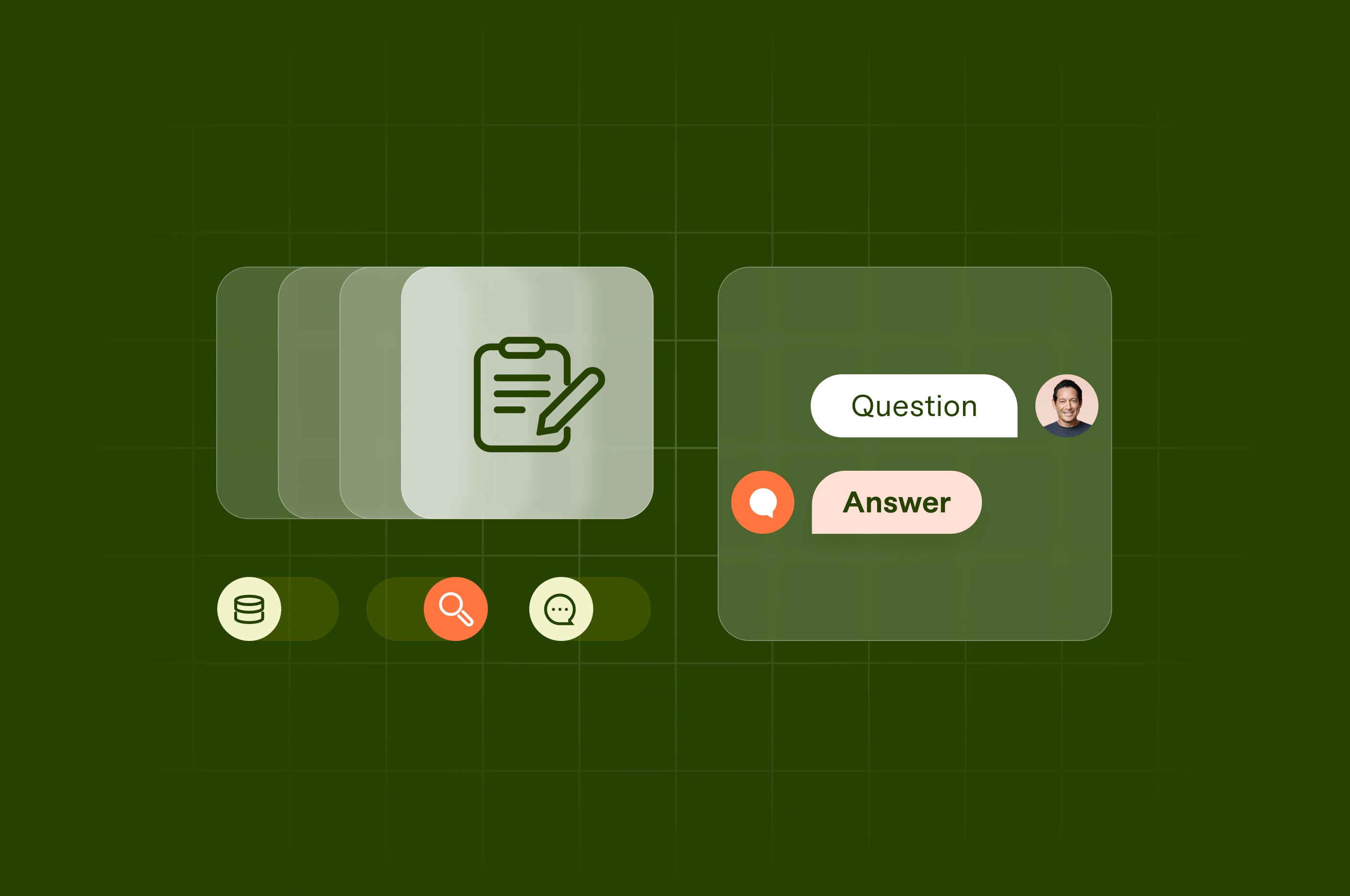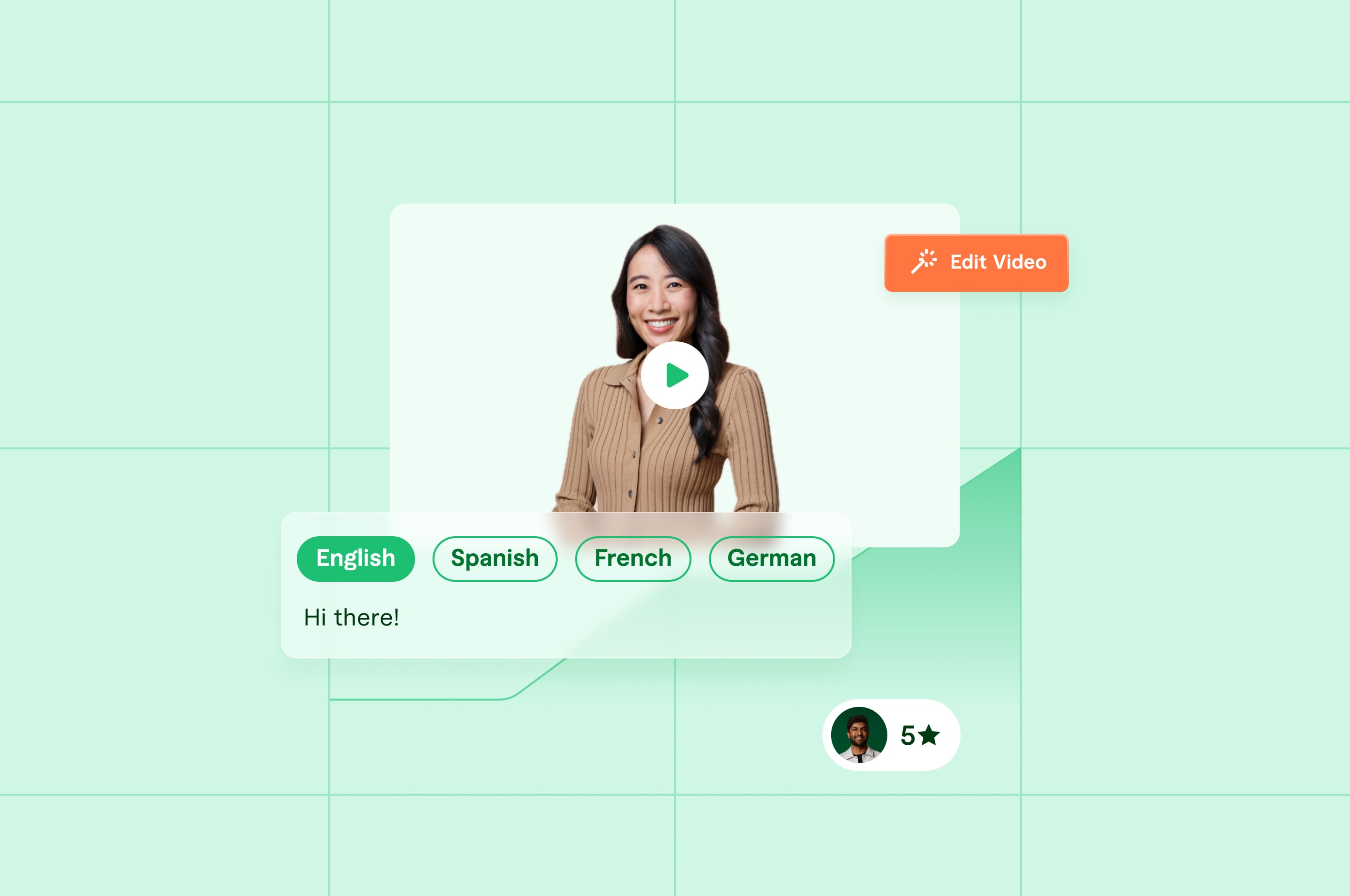The Best AI Search Engines of 2025
Compare the best AI search engines and find the best fit.
 March 5, 2025
March 5, 2025 12 minute reading
12 minute reading
It’s been nearly three decades since Google was founded. Since then, it’s become the most popular search engine with so much brand recognition that its name has become a verb for online search (aka “googling”).
However, with the continuous advancement of artificial intelligence (AI), Google isn’t the only search engine marketing platform anymore. Searching on AI platforms is now changing the way we look for information online.
If you want to switch up your search experience this year, let’s walk through the eight best AI search engines and our honest review of each.
Our review methodology
We chose eight of the most-used or well-known AI search engines (ChatGPT to Google Gemini) to see how they work and if they’re worth the hype.
To test each of the AI search engines, we wanted to come up with a way to easily compare each one—the results and the experience.
Starting with the results, we used the same search query, “What are the best starter house plants?” for each one to see how the results varied. We’ll also walk through the user experience for each search engine to showcase how they work and how easy or difficult they are to use.
The best 8 AI search tools
Now is a great time to discover which AI search engines to add to your research repertoire. Let’s cover the eight best options on the market.
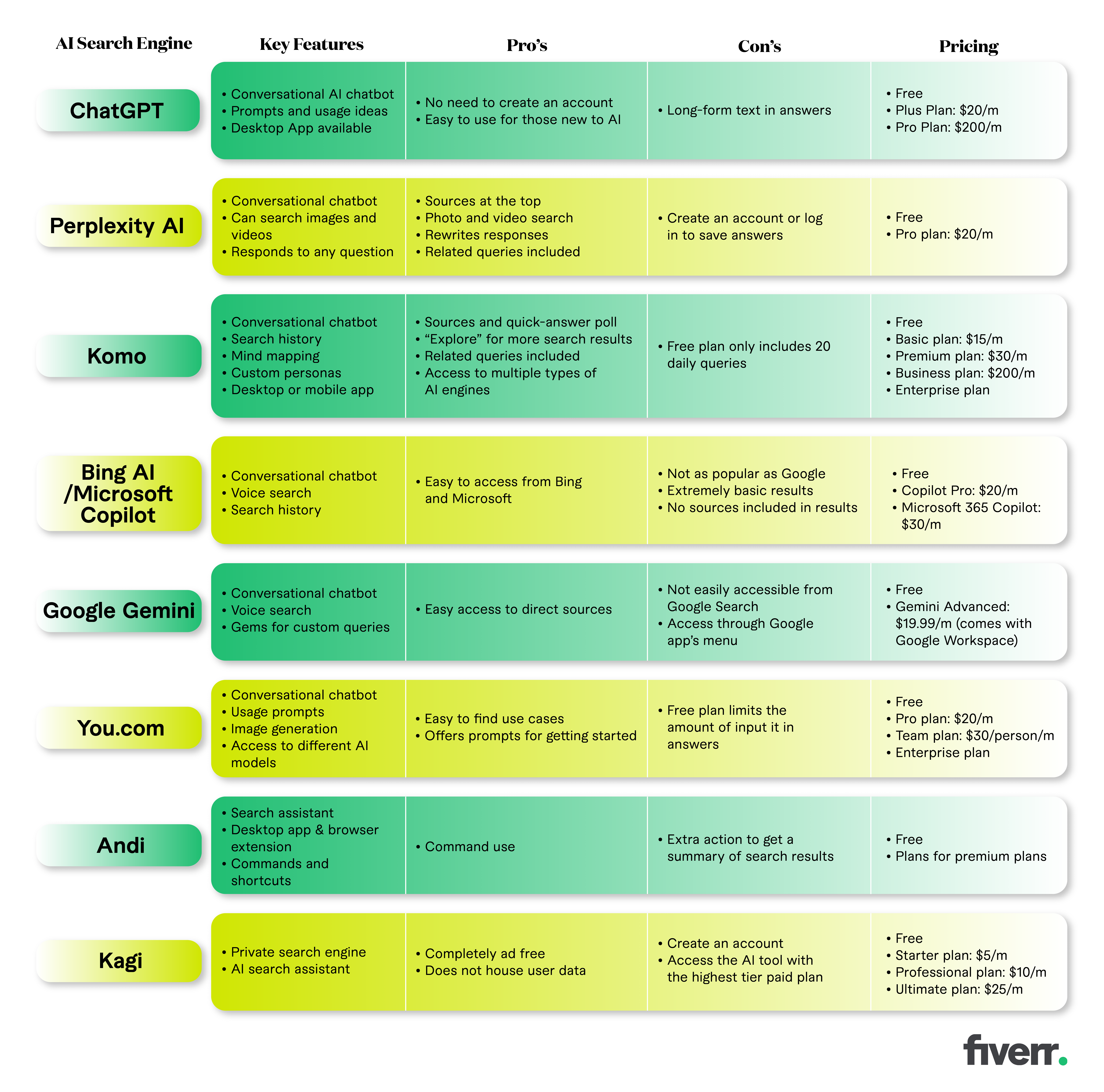
1. ChatGPT
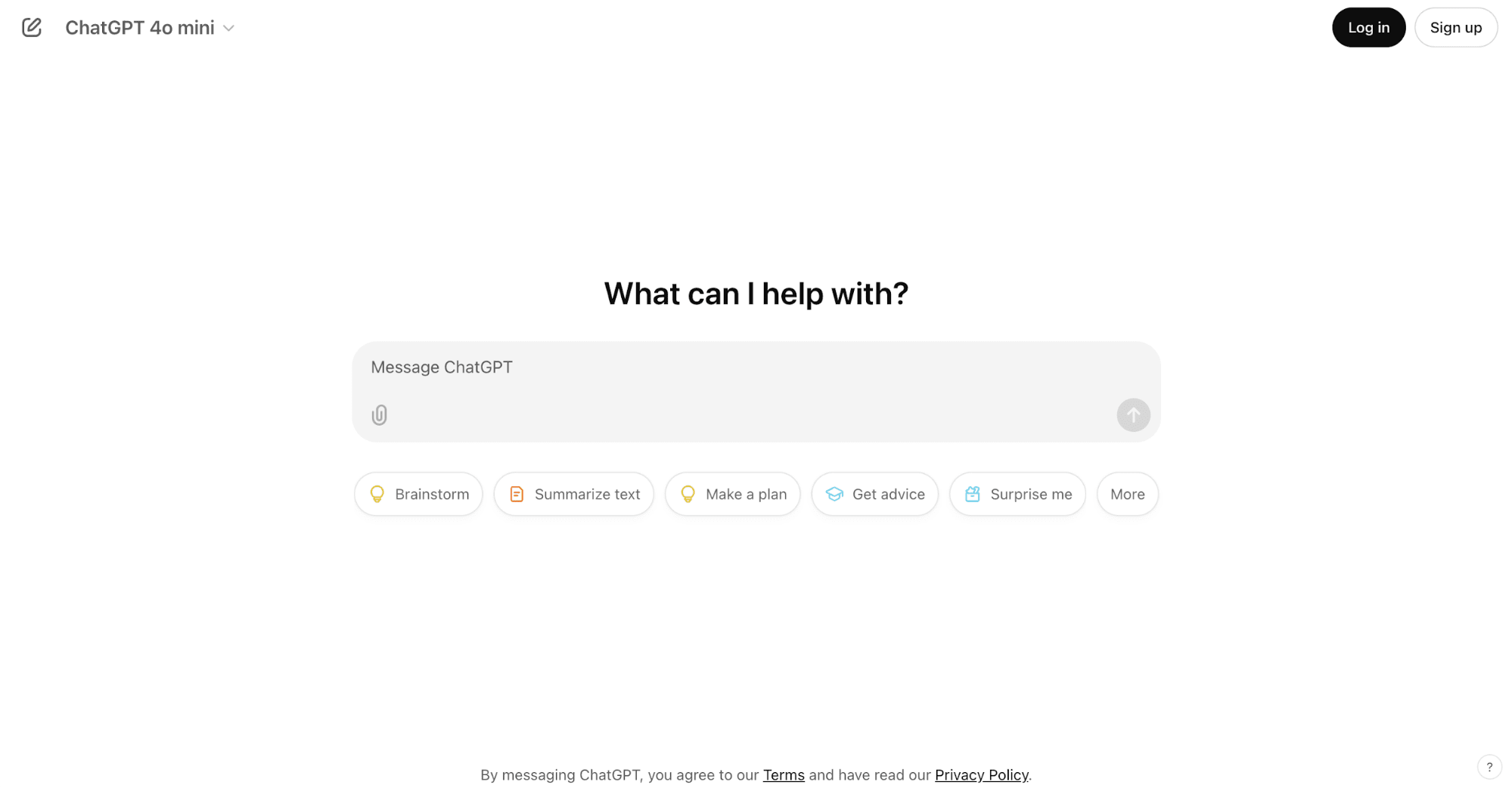
ChatGPT
ChatGPT is an AI chatbot created by the research organization OpenAI. It launched in 2022 and has been one of the most consistently popular AI tools ever since. ChatGPT is meant to use a conversational technique in its responses so that users can easily ask for more information and keep the conversation going.
ChatGPT’s user experience
We input our search query to see ChatGPT’s response. The way ChatGPT works is it immediately starts transcribing a response to your question right in front of you. The formatting is often the same, structured like a miniature blog post with an introduction, headers, and context.
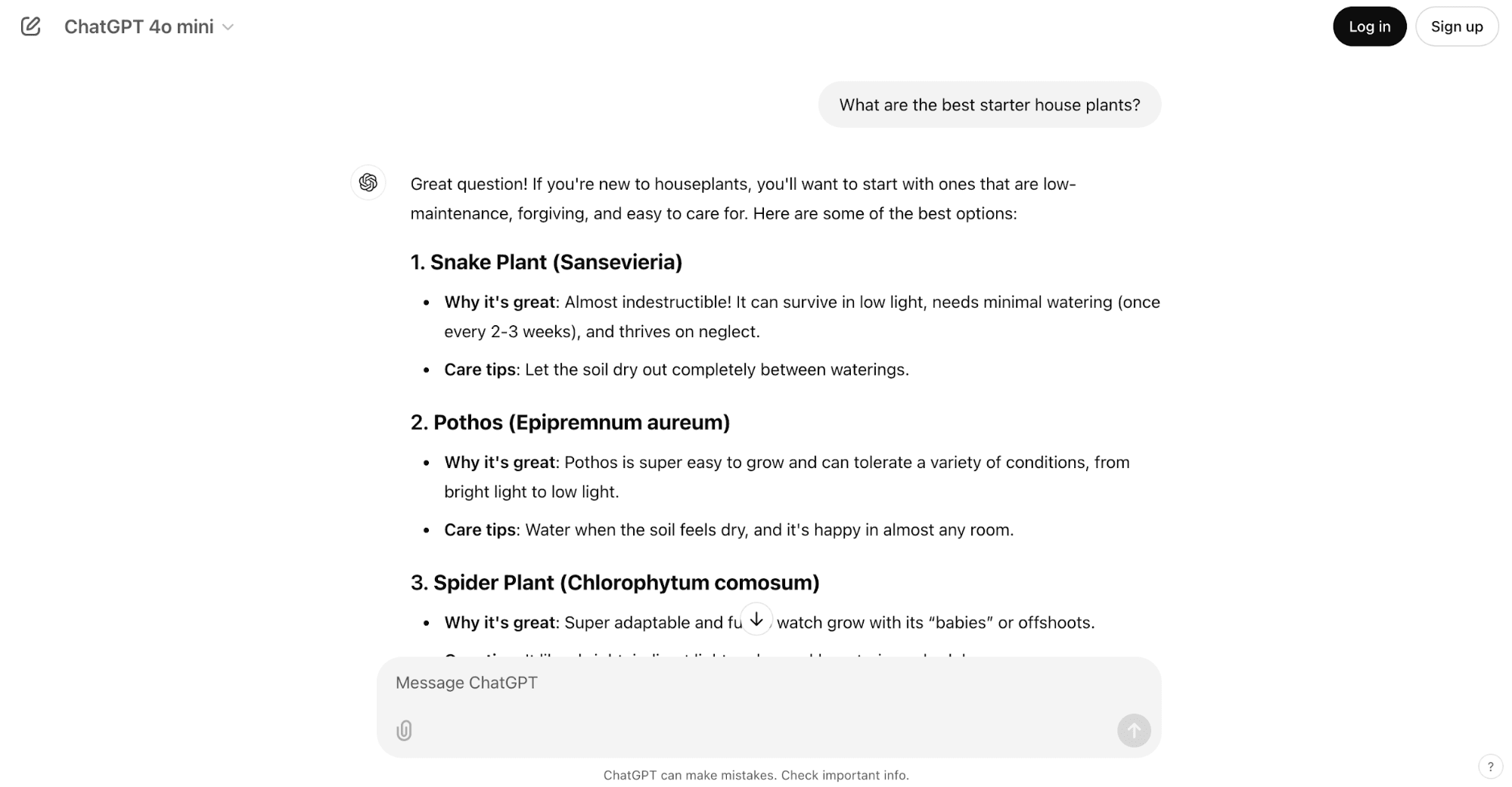
ChatGPT
The results are basic, but thorough, providing us with common names, scientific names, and why the plant is a great starter option. Plus, it gives care tips.
If you’re looking for more information, you can send another message with follow-up questions. For example, we could ask to get more information about what a snake plant is and how to take care of it.
ChatGPT uses a large language model (LLM) to perform natural language processing (NLP) in order to respond to your query in a way that’s easy to understand.
The tool’s free version is extremely user-friendly for those new to AI-powered search engines. Although ChatGPT is technically more of a chatbot than a search engine, it’s a great starting point for anyone looking to learn more about using AI.
ChatGPT’s key features
Conversational AI chatbot
Prompts and usage ideas
Desktop app available
ChatGPT’s pricing and plans
Free forever option for access to Chat GPT 4o mini and limited access to ChatGPT 4o
Plus plan for full access to ChatGPT 4o and other advanced features starts at $20/month
Pro plan with the highest level of access starts at $200/month
ChatGPT’s pros
You can use ChatGPT without having to create an account
It’s easy to use for those new to AI
ChatGPT’s cons
It’s not technically a search engine, responding to a query with long-form text rather than using any search features
Best for: Users who are new to AI tools.
ChatGPT’s user ratings
Look for an expert AI prompt engineer on Fiverr
2. Perplexity AI
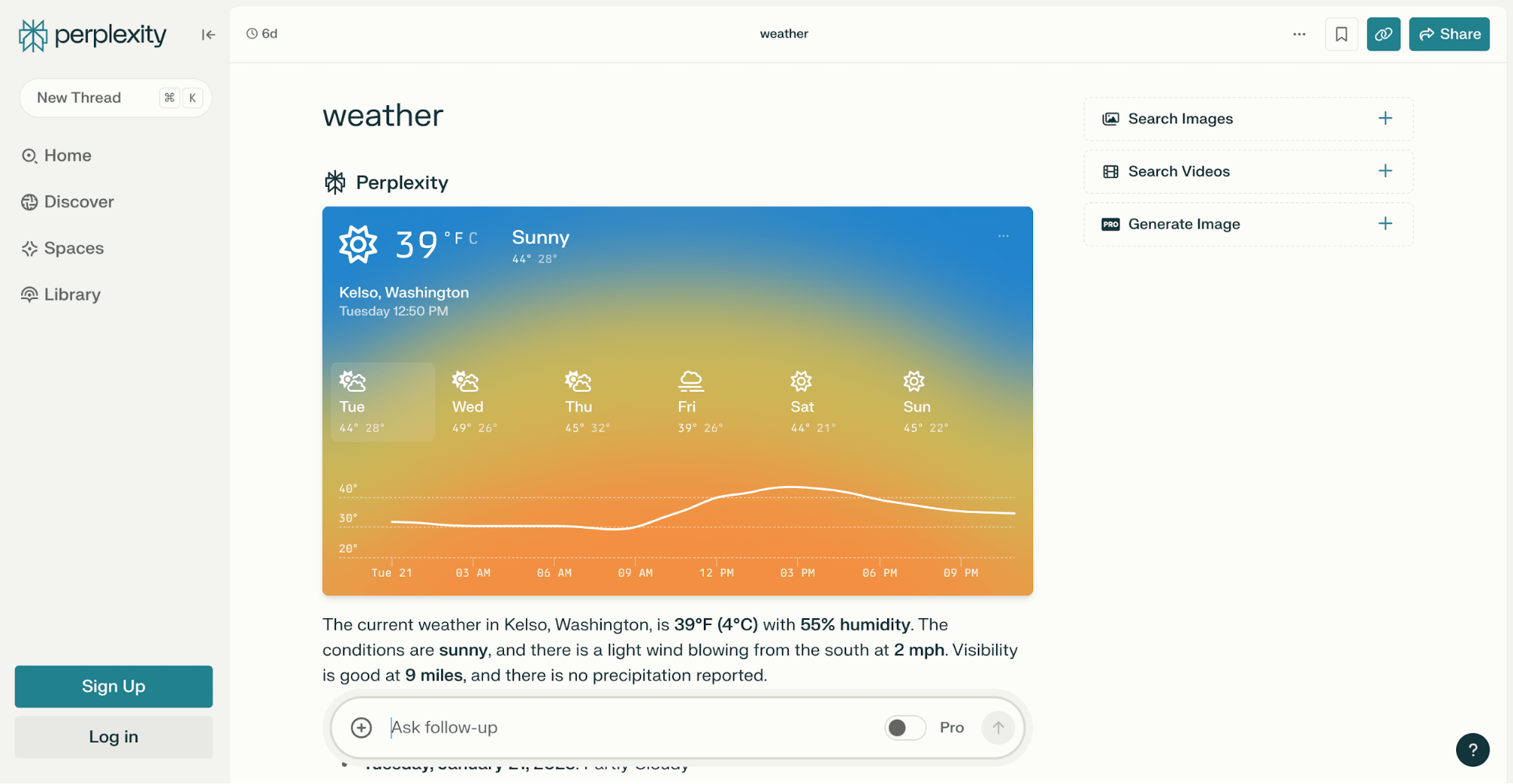
Perplexity
Perplexity calls itself an AI-powered answer engine that responds to any asked question. However, it also provides the ability to search through images and videos as a part of its service.
Perplexity AI’s user experience
Perplexity offers many more search capabilities than ChatGPT, making this a much better option for those looking for high-quality search results.
Take a look at our query below. Perplexity immediately offers search results as sources at the top of the query before diving into a written explanation of your results. However, the results are in a more visual format—a table rather than a long-form blog post summary.
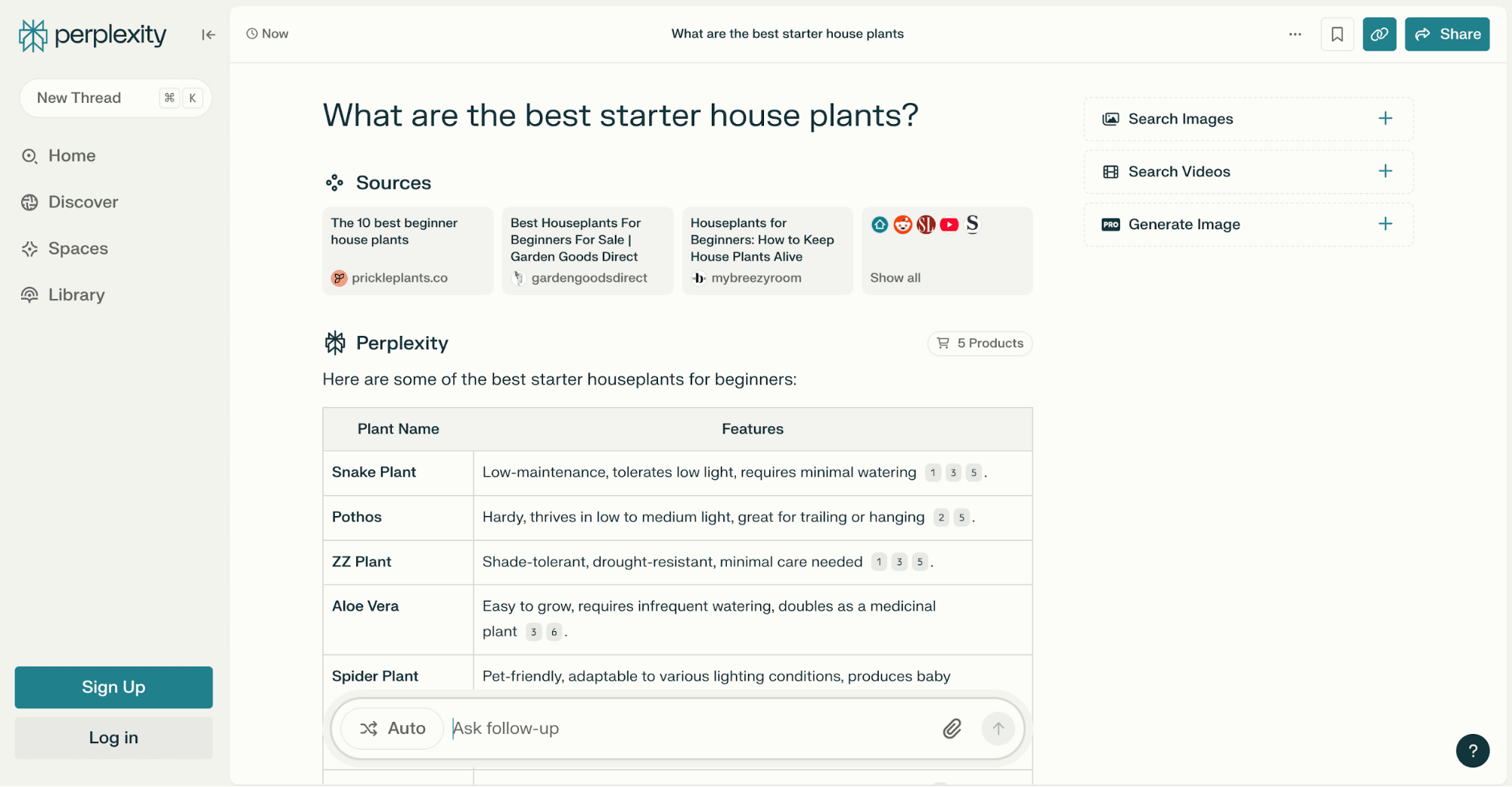
Perplexity AI
Furthermore, if you continue to scroll down, Perplexity also provides a list of relevant products that searchers can click to buy right from the search results. In this case, they’re starter plants that are hyper-relevant to the user query.
Perplexity also has the option to search images and videos in the right sidebar, providing you with even more relevant results. Ask a follow-up question, or scroll down for links to related queries.
Perplexity AI’s key features
Conversational chatbot
Can search images and videos
Responds to any question a user has
Perplexity AI’s pricing and plans
Free forever plan for unlimited quick searches and three Pro searches/day
Professional plan for $20/month with 300+ Pro searches/day
Perplexity AI’s pros
You get sources right at the top of the response
Photo and video search is easy to use and doesn’t move the user away from the chatbot.
You can have the AI rewrite its response if you’re looking for a different answer or need more information
The tool includes related queries at the bottom of its results
Perplexity AI’s cons
You have to create an account or log in to save answers to refer back to later
Best for: Users looking to compile information from different areas of a search engine (text, images, videos) quickly.
User ratings
3. Komo
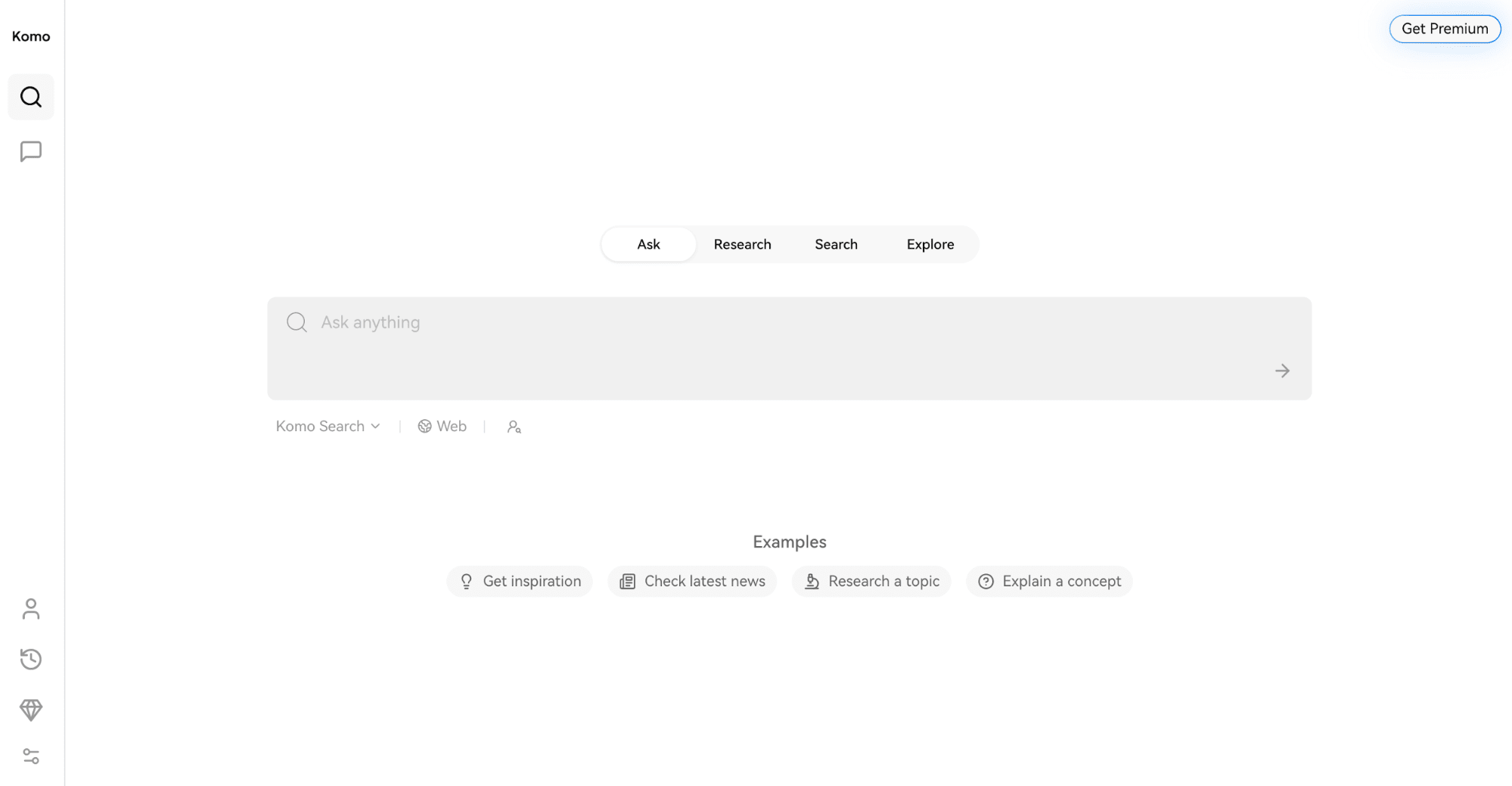
Komo
Komo is an AI-powered search tool that provides users with information in several formats. Ask questions and see original sources, a summary write-up by the AI, a poll, and more.
Komo’s user experience
When you submit your search query, Komo’s generative AI will display search results in real time. What we love about Komo is that you get a plethora of information on their results page.
First, they include a poll with every search query that provides a pie chart showcasing top results from its sources. Then, you’ll see some of the websites from which it pulled its information, and then you'll see a text summarizing its findings.
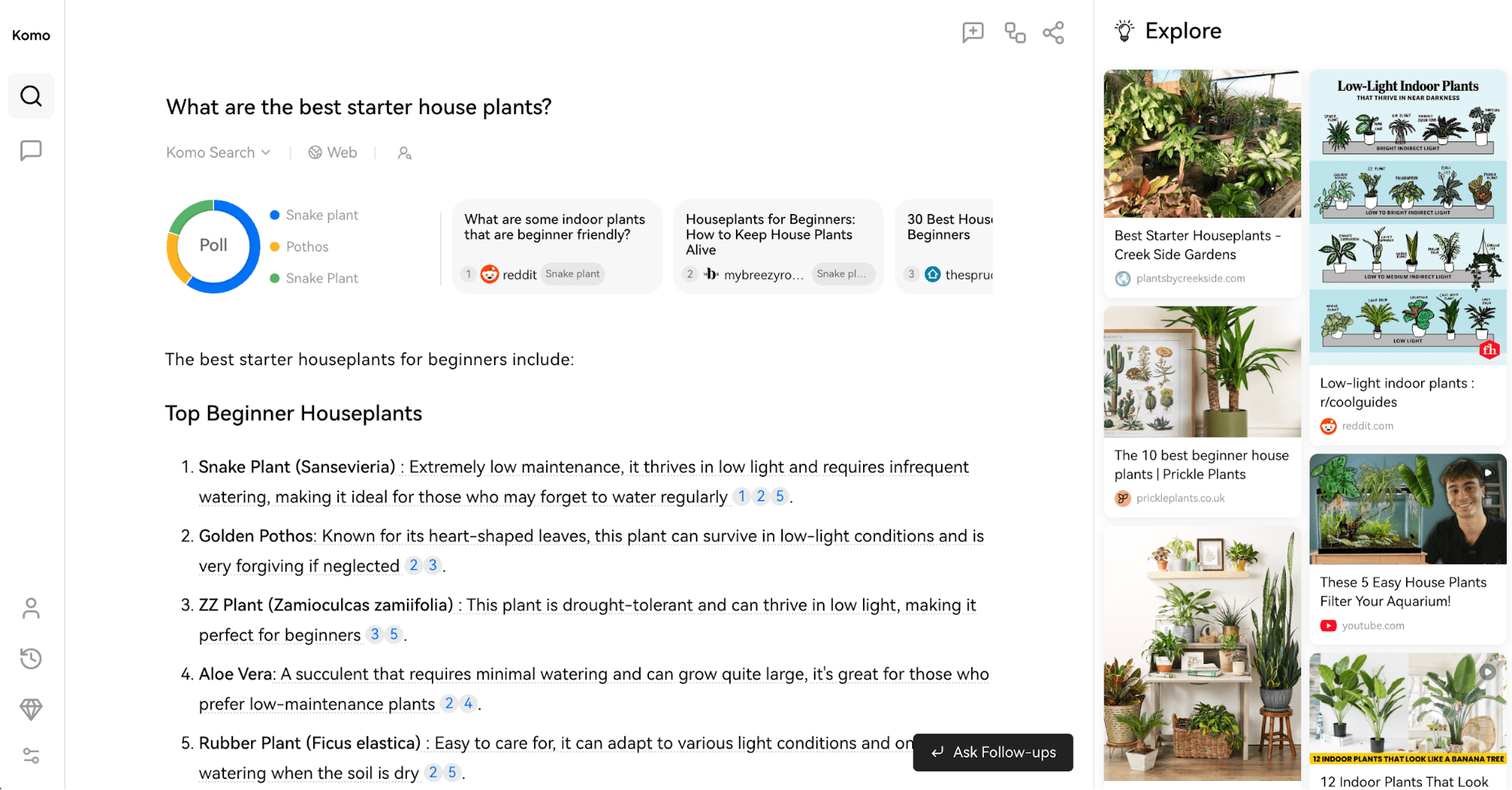
Komo
Each line of information comes with numbers for each source, helping users verify the accuracy of their results. Scroll down to find additional questions to increase your search, or click the button to ask a follow-up question.
Komo also lets you search using different personas. For example, you can choose “Explainer” to get the tool to create an in-depth summary of its findings or you can choose “TL;DR” for a quick synopsis. Other personas include:
Planner: Create step-by-step plans and strategies for achieving specific goals
Profile Researcher: Collect detailed information about a person or company before meetings.
Quote Collector: Find relevant quotes from notable figures and literature
Copywriter: Write persuasive and engaging content for various online marketing purposes
Equity Researcher: Conduct in-depth equity research and providing investment recommendations
Data Researcher: Find and organize data points about specific topics in a structured manner
Essay Writer: Write comprehensive and well-organized essays on various topics
Shopper: Generate detailed product recommendations and comparisons for shoppers
With all of the AI features included in Komo’s search results, we think this is one of the best options on our list. However, you must sign up for one of its paid plans to get extended access to the tool.
Komo’s key features
Conversational chatbot
Search history
Mind mapping
Custom personas
Desktop or mobile app
Komo’s pricing and plans
Free: Free forever plan with basic features
Basic plan: $15/month
Premium plan: $30/month
Business plan: $200/month
Enterprise plan for large companies with large-scale search needs: interested brands can contact Komo to get a personalized quote
Komo’s pros
You get sources and a quick-answer poll right at the top of the response
Access an “Explore” feature that lets you see more search results
The tool includes related queries at the bottom of its results
You can access multiple types of AI engines for your search
Komo’s cons
The free plan only includes 20 daily queries.
Best for: Users looking for a quick answer to search queries.
Komo’s user ratings
Product Hunt: 4.5/5
4. Bing AI/Microsoft Copilot

Microsoft Copilot
Microsoft Copilot is the Microsoft/Bing version of an AI SEO chatbot. You can access this by clicking on the rainbow Copilot logo next to the search bar on Bing’s homepage. If you’ve already conducted a Bing search, click the “Copilot” tab to view your results with the AI assistant.
Copilot’s user experience
Copilot summarizes Bing’s regular search results into a basic paragraph or list of information. As you can see below, we have a very basic response to our query.
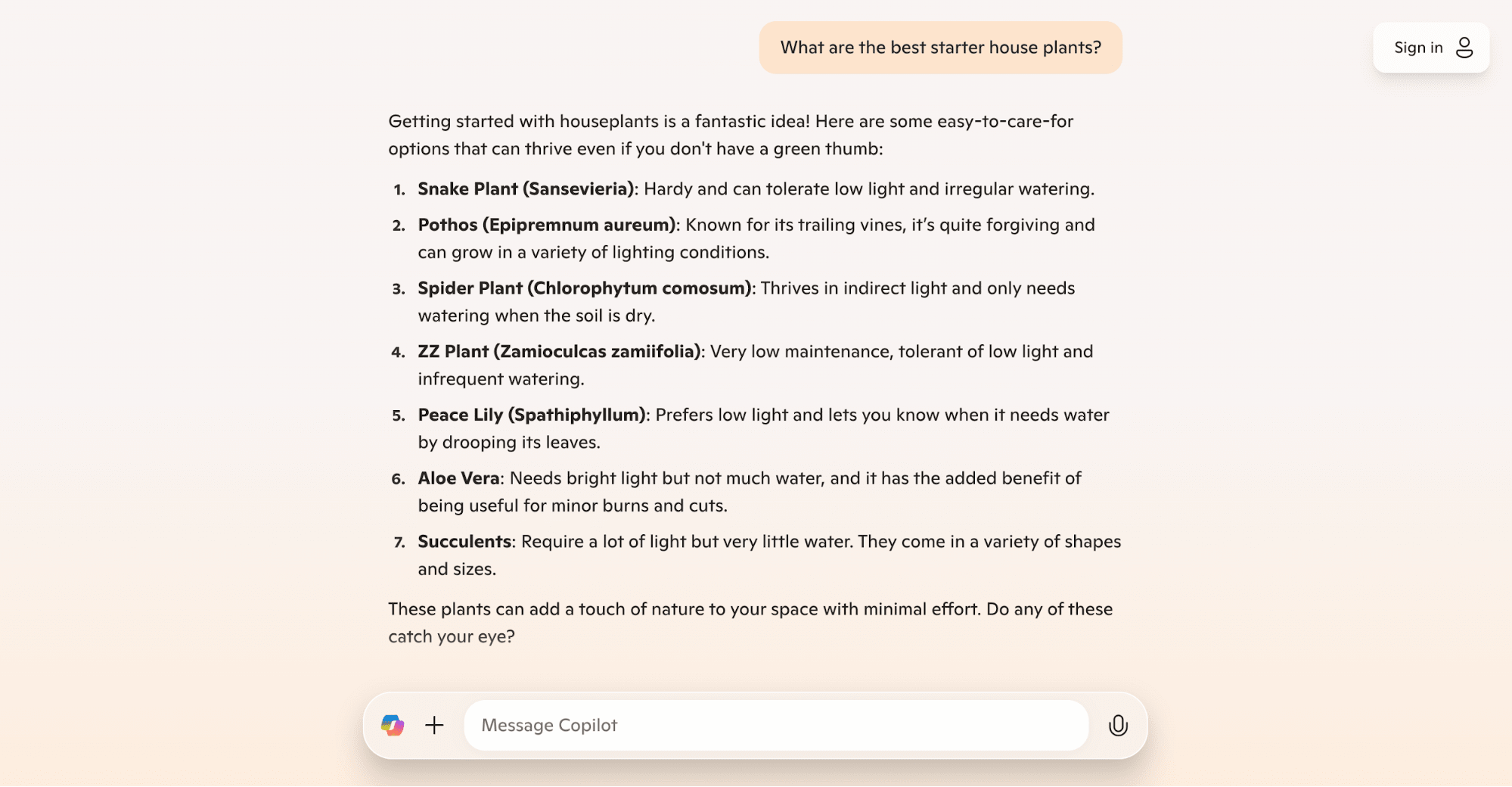
Copilot
While this is useful for someone who doesn’t want to scrounge through a full page of search results, Copilot doesn’t really have anything special to offer in the way of AI features.
Copilot’s key features
Conversational chatbot
Voice search
Search history
Copilot’s pricing and plans
Free forever version for basic search queries
Copilot Pro is $20 per month, giving you access to even more features
Microsoft 365 Copilot for business users is $30 per month, enabling even more features and integrating seamlessly with Microsoft 365 apps
Copilot’s pros
Copilot is easy to access for Bing and Microsoft users
Copilot’s cons
Bing/Microsoft isn’t as popular as Google
The results are extremely basic
There are no sources included in results
Best for: Companies that use Microsoft 365 or Microsoft Teams
Copilot’s user ratings
5. Google Gemini
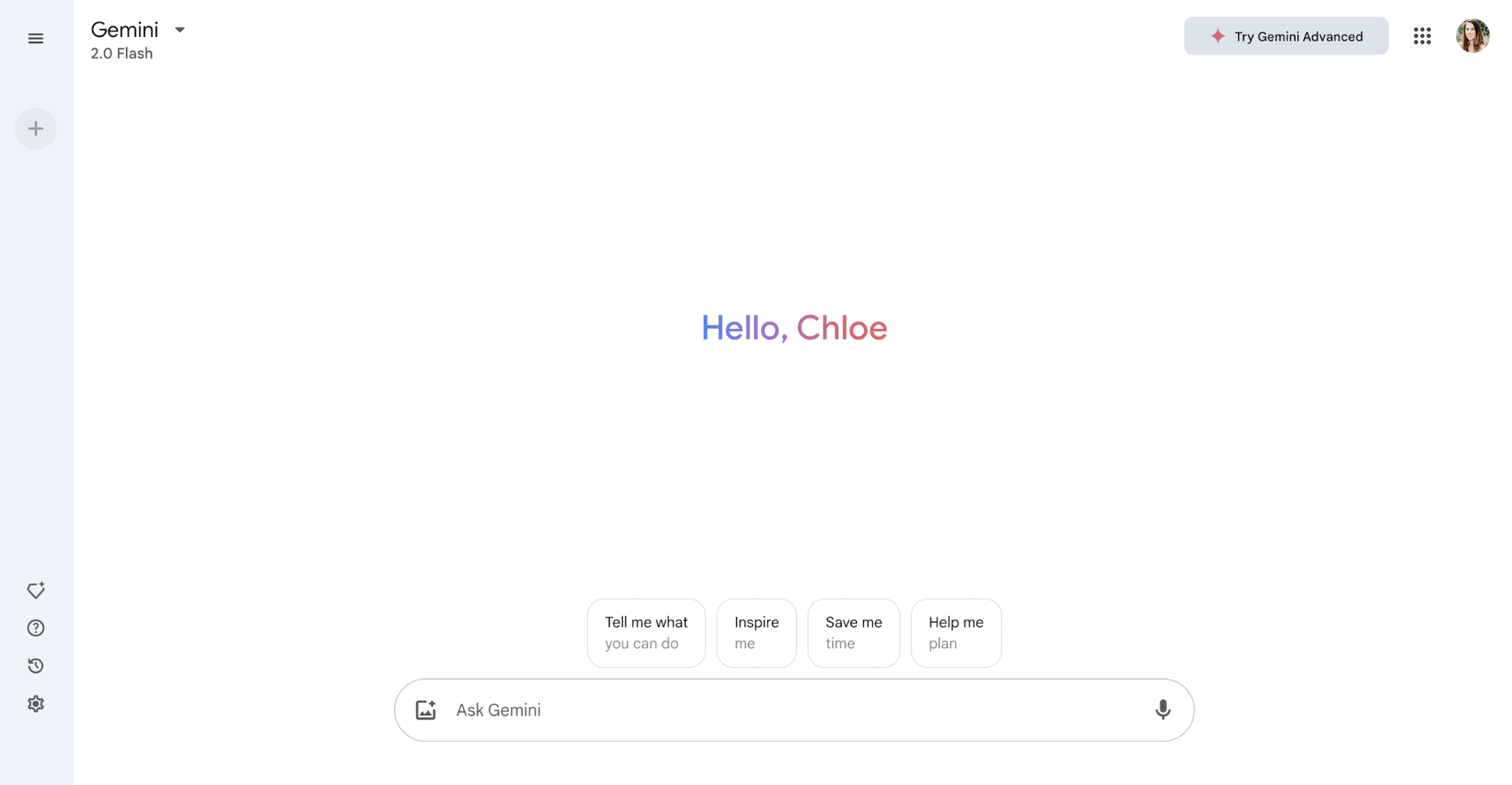
Gemini
Google has two different AI tools: an AI overview that appears at the top of search results, summarizing findings, and Google Gemini, its version of an AI chatbot.
The Google AI overview is useful for those using Google’s traditional search engine. Gemini works much like many of the AI software and tools in this list, responding with answers to any query a user may have.
Gemini’s user experience
You can open Google Gemini by clicking on the menu of Google Apps in the top right corner of any Google page or app. Input your search query by typing it into the search bar, clicking the microphone to activate voice search, or uploading an image as part of your search.
Below, we input our question about starter plants to see the results:
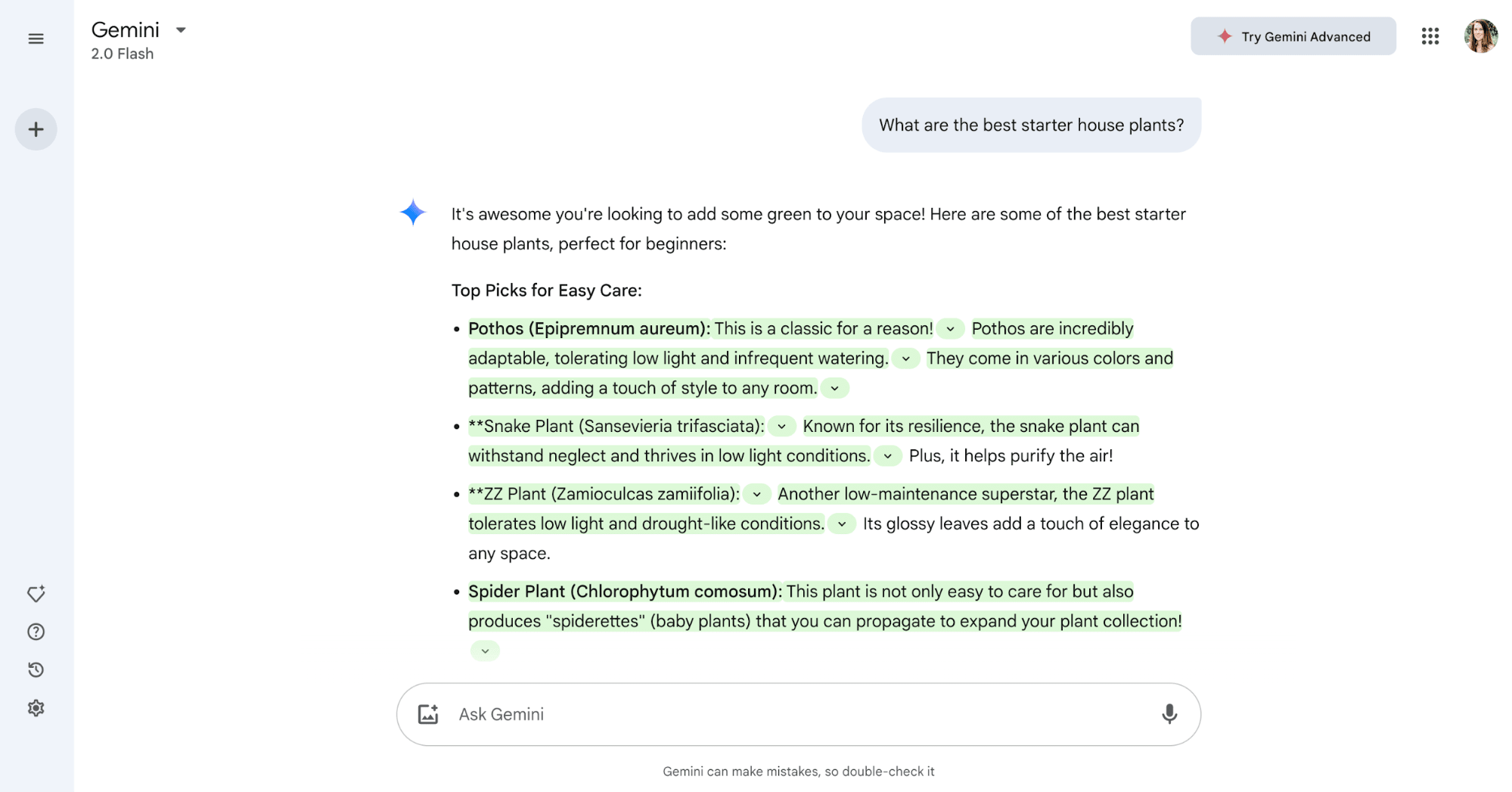
Gemini
In the above response, you can click on all the green highlighted text to access its direct source. In other queries we’ve made, Gemini will include a link to the web page it pulled its information from right below each point, making it easy to verify results. Users can easily ask follow-up questions to get even more information.
One of Gemini’s main features is its “Gems,” or custom AI assistants that users can create that take over certain tasks. For example, users can access the pre-made “Brainstorming” Gem to help come up with ideas for AI consulting clients. Gems are part of Gemini Advanced.
Gemini’s key features
Conversational chatbot
Voice search
Gems for custom queries
Gemini’s pricing and plans
Free: Free forever plan for all Google users
Gemini Advanced: $19.99/month (comes with Google Workspace)
Gemini’s pros
Google Gemini provides easy access to direct sources for its results
Gemini’s cons
It’s not easily accessible from Google Search
You have to access it through the Google app menu
Best for: Companies that use Google Workspace, as you automatically get access to Gemini Advanced
Gemini’s user ratings
Find an AI artist for your business
6. You.com
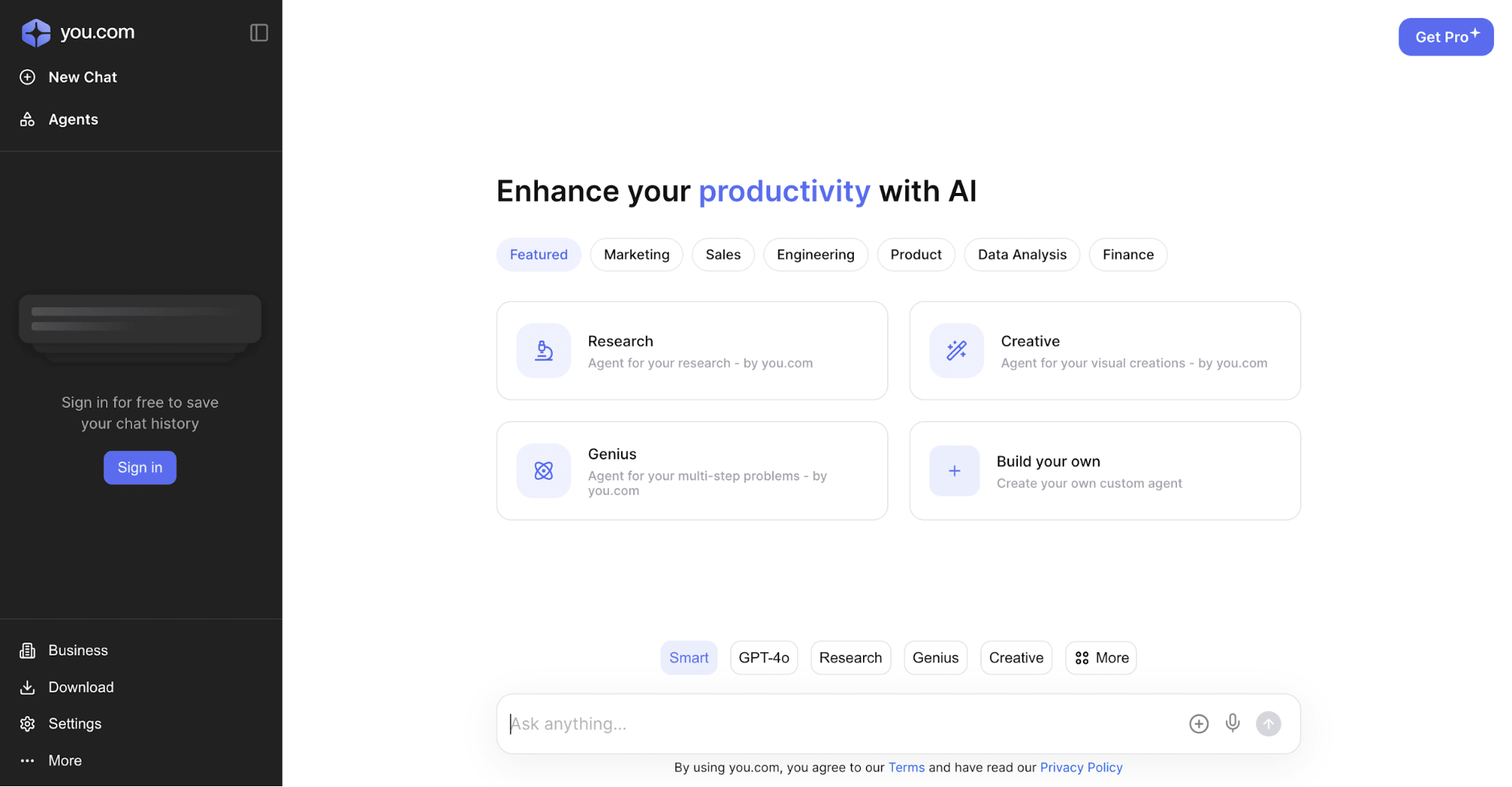
You.com
You.com refers to itself as an AI for productivity, and being able to conduct searches is just one part of that. Above the text box, you can select different reasons for using the AI, from research (for search engine queries), creative (for visual AI content creation), and genius (for multi-step workflows). Or, you can create your own custom agent (part of the pro plan).
However, these also change if you select different industries, giving you prompts that are more catered to what you’d need to use the AI for if you work in marketing, sales, or finance.
You.com user experience
With our test of You.com, we just did a basic “Smart” search. The platform then walks through its workflow (thinking, searching, thinking, then responding) before compiling its results in real time.
The smart search results are pretty basic—just a summary of information from related web pages. However, You.com offers a number of different types of searches to help people find exactly the type of information they need.
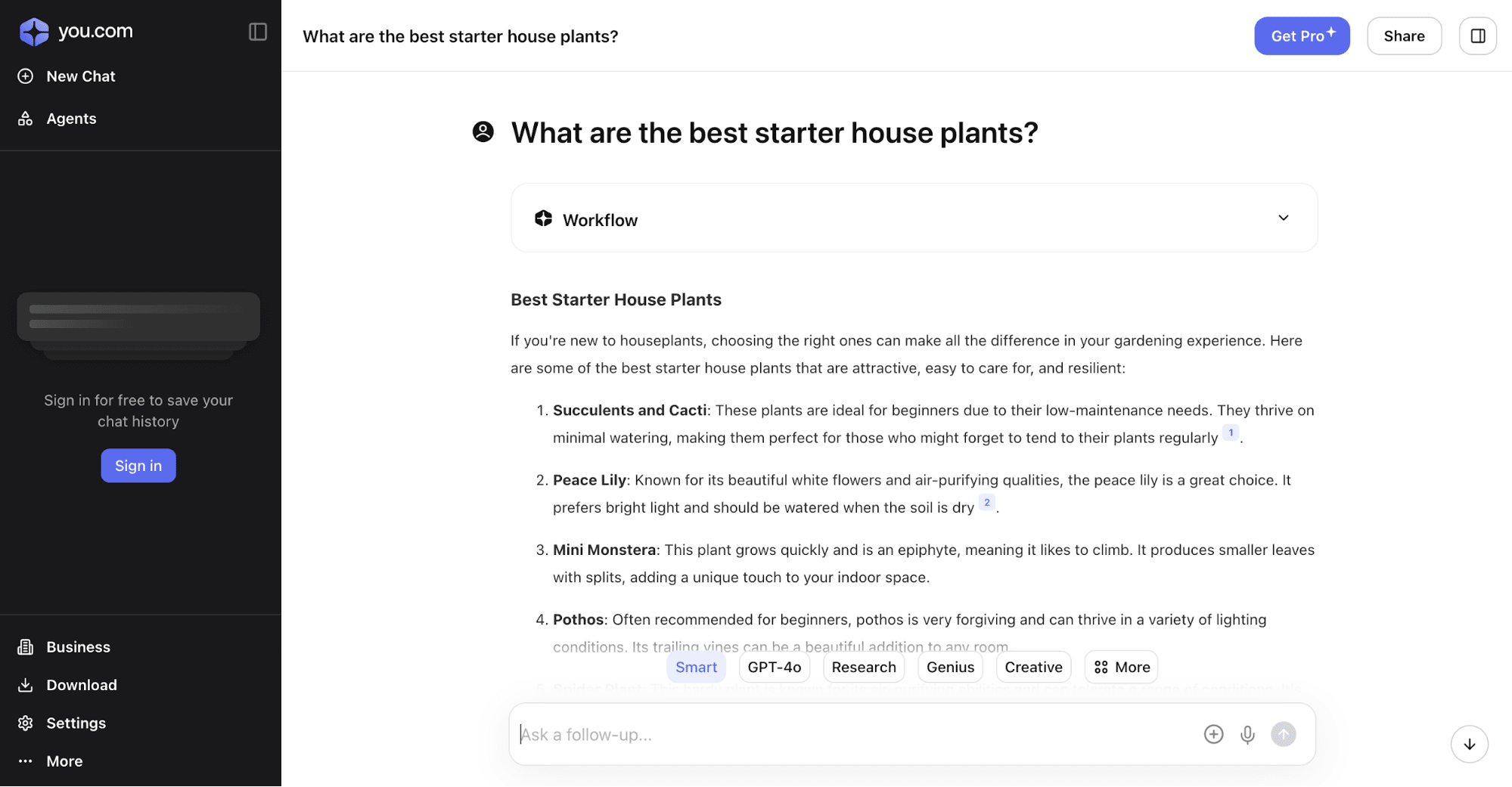
You.com
While free users can access basic smart searches, businesses looking to access further features will need to create an account and sign up for a paid plan.
You.com key features
Conversational chatbot
Usage prompts
Image generation
Access to different AI models
You.com pricing and plans
Free: Free forever plan with limited access
Pro plan: $20/month
Team plan: $30/person/month
Enterprise plan: For large-scale usage, contact for a quote
You.com pros
It’s easy for businesses to find use cases as You.com offers a number of prompts for getting started
You.com cons
The free plan only gives you access to a 16k context window, meaning the AI is limited in the amount of input it can put into your answers
Best for: Users looking for an AI tool to help with their business functions
You.com user ratings
Product Hunt: 3.9/5
G2: 4.4/5
7. Andi
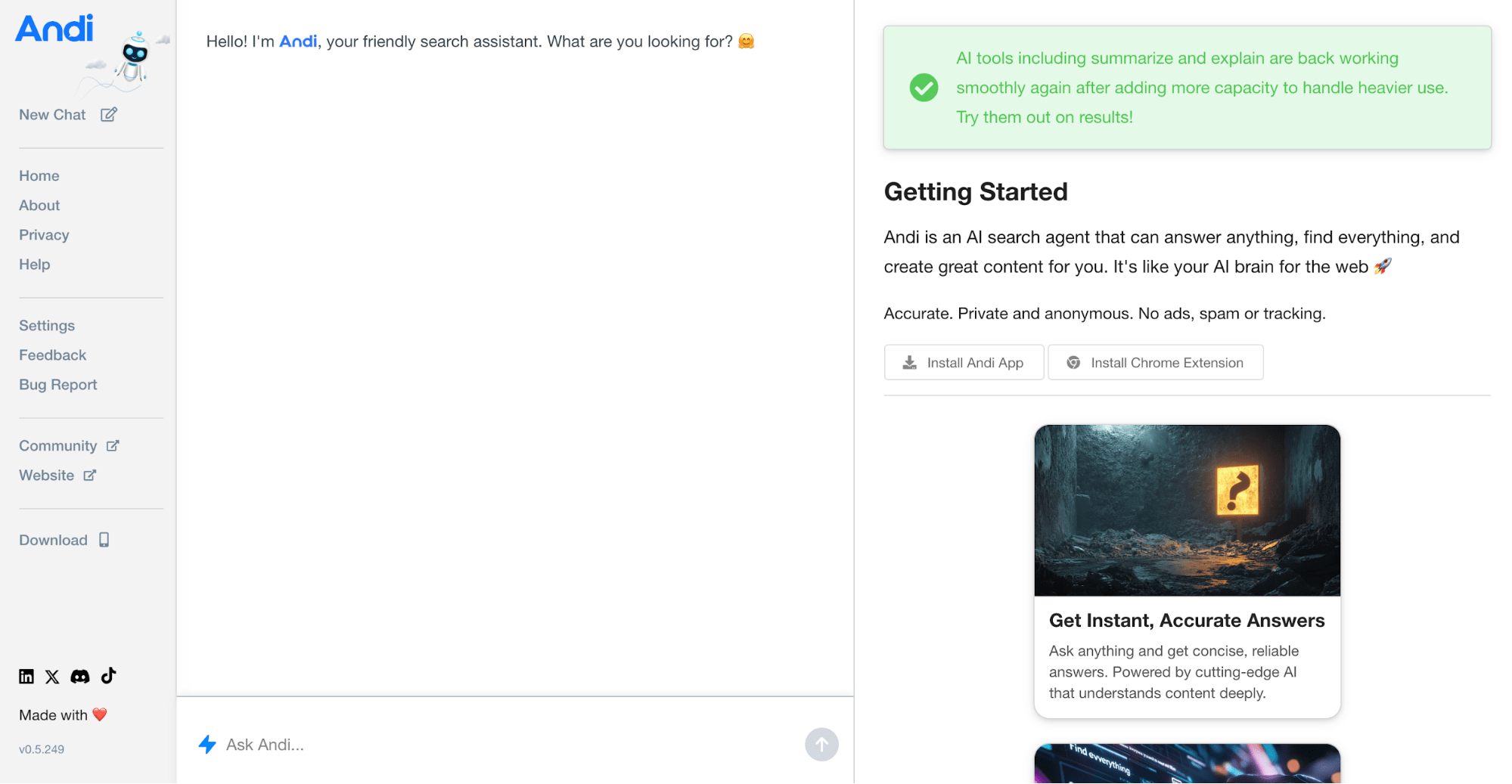
Andi
Andi is a search assistant, meaning you type in a query and it finds the most relevant article online to answer it. However, you can also have the tool generate a response as well. In Andi’s AI-generated words, this AI search engine “delivers search results as direct answers rather than lists of links.”
Andi’s user experience
Andi offers a unique experience compared to the other options on our list. Instead of compiling a few paragraphs or a listicle based on a summary of search results, Andi finds what it thinks is the most relevant article or web page for your query and delivers it.
So in our case, we were given an article from The Spruce sharing the 30 best houseplants for beginners.
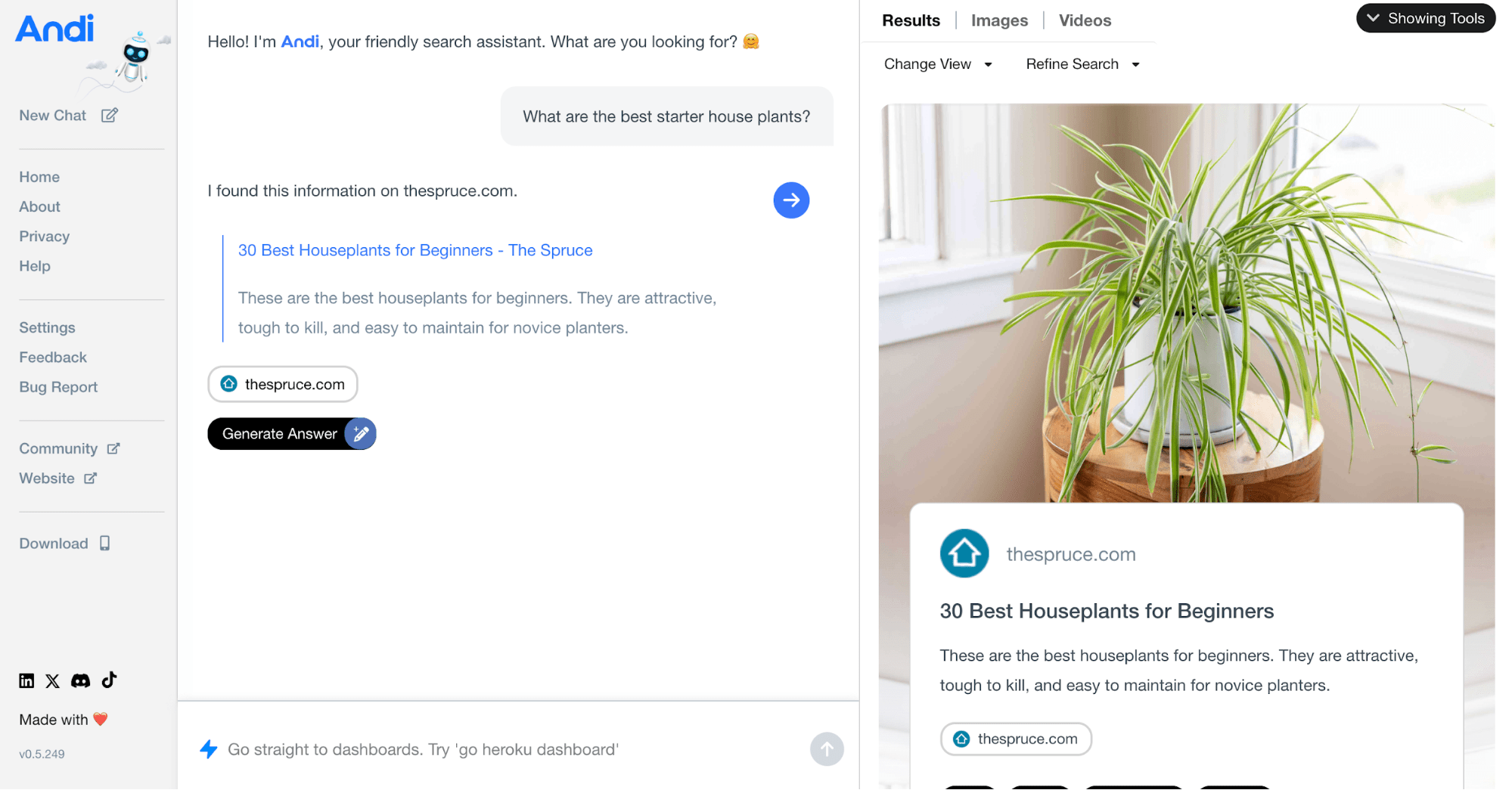
Andi
However, you can also have the AI generate an answer if you’re not looking to click through to another website. In addition, you can scroll down the results page on the right to see other options and ask the AI to summarize or explain them to you.
Andi also lets you type different commands into its search bar in order to be taken directly to a website or landing page. For example, typing “go best buy laptops” takes you to a page with laptops available for purchase from Best Buy’s website.
Andi’s key features
Search assistant
Desktop app and browser extension
Commands and shortcuts
Andi’s pricing and plans
Andi is currently completely free to use, though it plans to adopt a “freemium” model in the future, with premium plans that will offer extended access
Andi’s pros
One of the coolest features of Andi is its use of commands. For example, users can type “go [website]” and immediately be taken to that website in a new tab
Andi’s cons
You have to take another action to get a summary of search results
Best for: Users looking for another way to use the internet
Andi’s user ratings
Product Hunt: 4.8/5
Find a AI Content Editor for Hire
8. The Assistant by Kagi
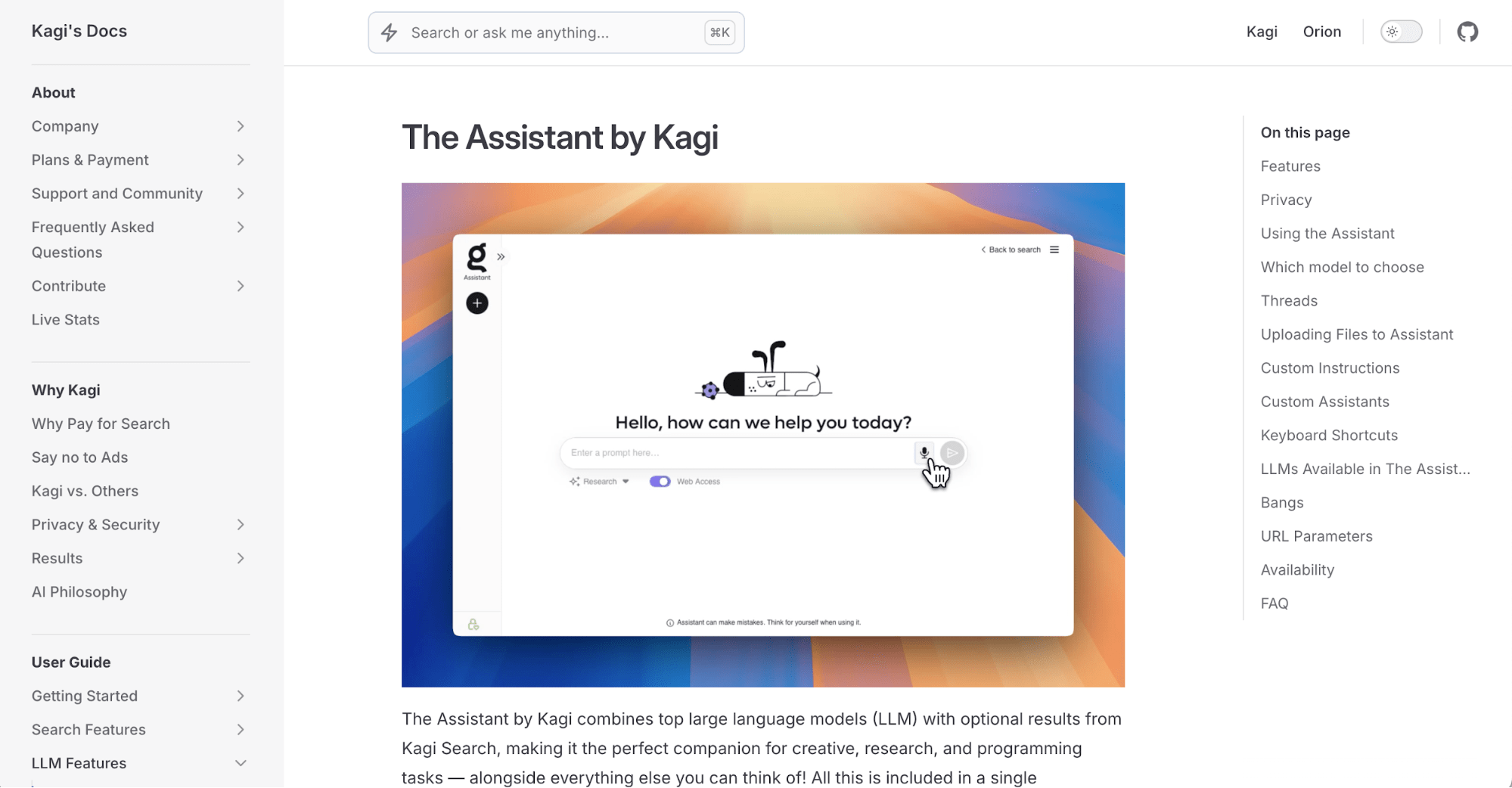
Kagi
Kagi is a search engine alternative to Google and Bing—though it’s a paid search engine. It also has its own AI assistant (competing with the likes of Gemini and Copilot) aptly named “The Assistant.” This AI tool is only available with Kagi’s ultimate plan, set at $25/month. Brave Search is another privacy-focused search engine with a similar user experience.
Kagi’s user experience
As Kagi’s AI is behind a paywall, we weren’t able to take it for an actual spin. However, the tool has a video showcasing its basic usage. You can type out or use voice search to input your query. Then, the AI will compile results based on its research across the web.
Users can save past searches to a “Quick Access” list to refer back to later if they’re gathering data and information and want to save the most pertinent results. You can also share a search query with someone you’re working with.
Essentially, the AI tool functions similarly to many others on this list. However, if you’re looking for the bonus of searching privately, Kagi is the perfect option.
Kagi’s key features
Private search engine
AI search assistant
Kagi’s pricing and plans
Free: Kagi’s search engine offers 100 free searches total before users must sign up for a paid plan
Starter plan: $5/month for 300 monthly searches
Professional plan: $10/month for unlimited searches
Ultimate plan: $25/month for unlimited searches and access to advanced features like The Assistant
Kagi’s pros
Kagi is completely ad free and doesn’t house user data, so it’s perfect for users looking for a more private search experience
Kagi’s cons
You have to create an account to use Kagi
You can only access the AI tool with the highest tier paid plan
Best for: Users looking for a private search experience
Kagi’s user ratings
Product Hunt: 5/5
Trustpilot: 4/5
Hire AI specialists on Fiverr today
Want to learn how to better use tools like AI search engines for your business or everyday use? Fiverr has a number of AI specialists you can work with to optimize your usage and integrate these tools within your business.
AI search tools FAQs
Which is the best AI search tool?
The best AI search tool depends on your needs. However, based on our review, one of the best AI search tools out there is Komo.
Are AI search tools accurate?
As you’ll see in a disclaimer on every AI search tool, you always need to verify AI search results to see if you’ve gotten accurate results. The results are based on machine learning, which takes time. These tools are still new and are perfecting the results they can offer.
Can AI improve search results for businesses?
Yes, AI can help you find new angles and results you may not have found from a traditional search.
What’s the difference between AI search tools and traditional search engines?
Traditional search engines use algorithms to put the best search results in front of you. AI search tools look through those results and put together an AI-generated answer based on what it thinks is the best answer to your query.




